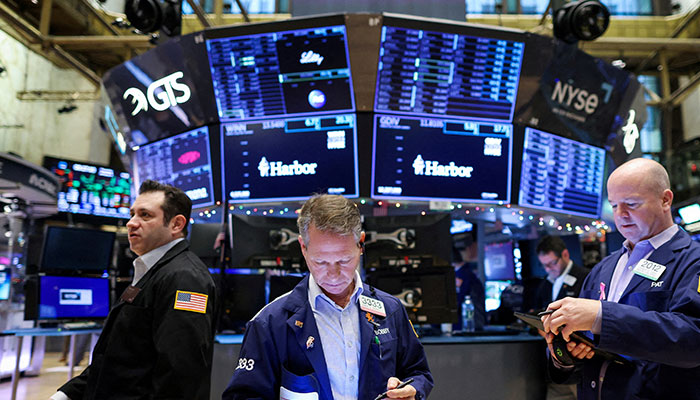Pandemic-era winners suffer $1.5 trillion fall in market value
London: Fifty corporate winners from the coronavirus pandemic have lost roughly $1.5 trillion in market value since the end of 2020, as investors turn their backs on many of the stocks that rocketed during early lockdowns.
According to data from S&P Global, technology groups dominate the list of the 50 companies with a market value of more than $10 billion that made the biggest percentage gains in 2020.But these early-pandemic winners have collectively shed more than a third of their total market value, the equivalent of $1.5 trillion, since the end of 2020, Financial Times calculations based on Bloomberg data found.
Video-conferencing company Zoom, whose shares soared as much as 765 percent in 2020 as businesses switched to remote working, has been one of the biggest losers. Its stock has fallen about 80 percent, equivalent to more than a $77 billion drop in market value, since the end of that year.
Cloud-based communications company RingCentral also surged in the remote working boom of 2020 but has since shed about 90 per cent of its value, as it competes with technology giants such as Alphabet and Microsoft.
Exercise bike maker Peloton has been another big loser, with shares down more than 97 percent since the end of 2020, equivalent to about a $43 billion loss of market value.Peloton on Thursday said chief executive Barry McCarthy would step down and it would cut 15 percent of its workforce, the latest in a series of cost-saving measures.
The losses come as the sharp acceleration of trends such as videoconferencing and online shopping driven by the lockdowns has proven less durable than expected, as more workers migrate back to the office and high interest rates and living costs hit ecommerce demand.
“Some companies probably thought that shock was going to be permanent,” said Steven Blitz, chief US economist at TS Lombard. “Now they’re getting a painful bounceback from that.”In percentage terms, Tesla was the biggest winner of 2020. The electric-car maker’s market value jumped 787 percent to $669 billion by the end of that December, but has since slipped back to $589 billion.
Singapore-based internet company Sea came in second, as its market value jumped from $19 billion to $102 billion following a pandemic-era surge for all three of its core businesses: gaming, ecommerce and digital payments. But the company has since lost more than 60 percent of its end-2020 value amid fears of a slowdown in growth.
Ecommerce groups Shopify, JD.com and Chewy, which initially thrived as online spending ballooned, have also suffered big losses.Vaccine hopes and demand for medical treatments also buoyed pharmaceutical groups such as Moderna and Pfizer in 2020, as well as lesser-known Chinese groups, including WuXi Biologics, Chongqing Zhifei Biological Products and Alibaba Health Information Technology.
Many vaccine makers’ pandemic-era gains have reversed, however, as investors become concerned about unpredictable demand for the shots. Pfizer has now completely erased its gains from 2020 and 2021, despite co-developing a widely used vaccine alongside German biotechnology company BioNTech.
Just seven of the 50 biggest corporate winners of 2020 have gained market value: Chinese carmaker BYD, cyber security group CrowdStrike, software companies The Trade Desk and Datadog, T-Mobile, Chinese technology company CATL and Latin American online marketplace Mercado Libre.
-
 Meghan Markle Showcases Princess Lilibet Face On Valentine’s Day
Meghan Markle Showcases Princess Lilibet Face On Valentine’s Day -
 Harry Styles Opens Up About Isolation After One Direction Split
Harry Styles Opens Up About Isolation After One Direction Split -
 Shamed Andrew Was ‘face To Face’ With Epstein Files, Mocked For Lying
Shamed Andrew Was ‘face To Face’ With Epstein Files, Mocked For Lying -
 Kanye West Projected To Explode Music Charts With 'Bully' After He Apologized Over Antisemitism
Kanye West Projected To Explode Music Charts With 'Bully' After He Apologized Over Antisemitism -
 Leighton Meester Reflects On How Valentine’s Day Feels Like Now
Leighton Meester Reflects On How Valentine’s Day Feels Like Now -
 Sarah Ferguson ‘won’t Let Go Without A Fight’ After Royal Exile
Sarah Ferguson ‘won’t Let Go Without A Fight’ After Royal Exile -
 Adam Sandler Makes Brutal Confession: 'I Do Not Love Comedy First'
Adam Sandler Makes Brutal Confession: 'I Do Not Love Comedy First' -
 'Harry Potter' Star Rupert Grint Shares Where He Stands Politically
'Harry Potter' Star Rupert Grint Shares Where He Stands Politically -
 Drama Outside Nancy Guthrie's Home Unfolds Described As 'circus'
Drama Outside Nancy Guthrie's Home Unfolds Described As 'circus' -
 Marco Rubio Sends Message Of Unity To Europe
Marco Rubio Sends Message Of Unity To Europe -
 Savannah's Interview With Epstein Victim, Who Sued UK's Andrew, Surfaces Amid Guthrie Abduction
Savannah's Interview With Epstein Victim, Who Sued UK's Andrew, Surfaces Amid Guthrie Abduction -
 Piers Morgan Supports Bad Bunny As US Lawmakers Seek Action
Piers Morgan Supports Bad Bunny As US Lawmakers Seek Action -
 Jennifer Love Hewitt Reminisces About Workign With Betty White
Jennifer Love Hewitt Reminisces About Workign With Betty White -
 Hilarie Burton Reveals Valentine's Day Plans With Jeffrey Dean Morgan
Hilarie Burton Reveals Valentine's Day Plans With Jeffrey Dean Morgan -
 Cardi B Compares Her Fall To Government At Las Vegas Show
Cardi B Compares Her Fall To Government At Las Vegas Show -
 Harry Styles Silently Deleted Instagram App
Harry Styles Silently Deleted Instagram App




